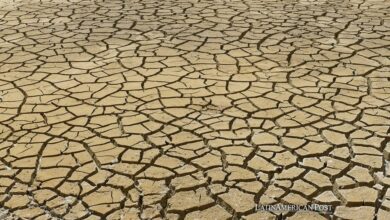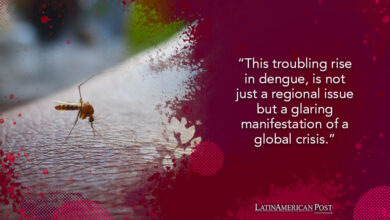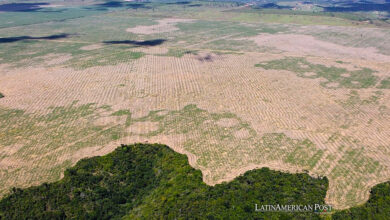Plastic in human placenta, deforestation control in Colombia and more environmental news
Summary of the most important environmental news during the week so that you end up well informed .

These are some of the biggest environmental news this week. / Photos: Pixabay
LatinAmerican Post | Vanesa López Romero
Listen to this article
Leer en español: Plástico en placenta humana, control de deforestación en Colombia y más noticias medioambientales
Scientists discover plastic in human placenta
The journal Environmental International published an article by a group of scientists from the Gynecology department of the Hospital San Giovanni Calibita Fatebenefratelli, in Rome. The study was led by Antonio Ragusa and consisted of analyzing six placentas of women between 18 and 40 years of age with normal pregnancies using Raman spectroscopy. They found twelve fragments of artificial material, these measure between 5 and 10 microns . Three were polypropylene, a thermoplastic polymer used to make bottles and the other nine, materials derived from paints.
So far, it is being investigated what are the risks to the human body and how did these particles enter the human body. However, the study ensures that "microplastics can pass from the environment to living organisms, including mammals ."
Plasticenta: First evidence of microplastics in human placenta – #PlasticPollutes #plasticistoxic https://t.co/5GZkC1Xqfg
— TheLastPlasticStraw (@NoPlasticStraws) December 15, 2020
A commission against deforestation is installed in the Senate of Colombia
Although the figures for deforestation in Colombia in 2020 are not yet known, some experts assure that it may have increased by 15% . Only between January and June of this year 65,200 hectares of forest were deforested in the Amazon region , according to data from the Institute of Hydrology, Meteorology and Environmental Studies (Ideam).
Bearing this in mind, the Colombian Senate decided to install an Accidental Commission that aims to "monitor the institutional and legal actions of the government to mitigate one of the main environmental problems of the country in view of the goals and commitments acquired for the year. 2030 ".
Likewise, " the commission will be made up of four male senators and one female senator from different political sectors who are already making proposals from the territory to protect ecosystems ," according to the statement issued by the institution.
Instalan comisión en el Senado para fortalecer la lucha contra la deforestación en Colombia – infobae https://t.co/2EXACrNYVB pic.twitter.com/52X0qj0Wb9
— Nuestro AMAZONAS (@NuestroAMAZONAS) December 21, 2020
Also read: The environment this week: Chile, Toyota and the European Climate Law
2020: a difficult year for Latin America in environmental terms
Although the arrival of the COVID-19 pandemic meant a significant reduction in pollution emissions throughout the world, deforestation in the region had records that are alarming . According to data from the Amazon Network for Georeferenced Socio-Environmental Information (RAISG), the deforested area of the Amazon increased by 9.5% between August 2019 and July 2020 (compared to the previous period).
In addition, it must be borne in mind that according to the report Defending Tomorrow: The climate crisis and threats against defenders of the land and the environment by Global Witness, several Latin American countries top the list of the most leaders and environmental defenders killed throughout the year 2019. Colombia and the Philippines have more than half of the reported murders .
#RAISG
Un incendio no necesariamente produce deforestación, pero varios, año tras año, empujan a la Amazonía en esa dirección.
Conoce lo que sabemos sobre el fuego y sus efectos en la presentación del Atlas #AmazoníaBajoPresión2020.
8 de diciembre
9:00 am
Bruno Kelly pic.twitter.com/DAn7OxsibQ— Gaia Amazonas (@gaiaamazonas) December 7, 2020
Nemonte Nenquimo: winner of the "nobel" of environment
The representative of the Waoranim ethnic group in Ecuador was awarded what is considered the nobel for the environment: the Goldman Environmental Prize . According to the organization, Nemonte Nenquimo is the recipient of this award for leading "an indigenous campaign and a legal action that led to a court ruling to protect 202,342 hectares of Amazon forest and Waorani territory from oil extractivism ."
The award was also presented to Leydy Pech (Mexico), Kristal Ambrose (Bahamas), Paul Sein Twa (Myanmar), Lucie Pinson (France) and Chibeze Ezekiel (Ghana) .
Una lucha colectiva
“Si dejamos que la Amazonía se destruya poco a poco, por supuesto, eso nos afecta como #PueblosIndígenas, pero también afectará a todos por el cambio climático. Nuestra lucha es por toda la humanidad”.
–#NemonteNenquimo, #CampeonaDeLaTierra @unep_espanol pic.twitter.com/MPbQGT8UTO
— Waorani Resistencia Pastaza (@WaoResistencia) December 11, 2020
5 years of the Paris Agreement have passed
Five years ago world leaders agreed on a plan to reduce pollutant emissions and limit climate change. There were 195 countries that signed, and today 5 years later, emissions only continue to increase . According to experts and UN reports, the COVID-19 pandemic was a blow to achieve these purposes, because although there was a significant reduction in emissions due to isolation around the planet, priorities changed in governments and they have focused in reestablishing the economy of each of the countries .
According to the Climate Change Index. The 57 countries responsible for 90% of emissions are not doing enough to lower their numbers. Global temperature is already expected to reach 3 degrees Celsius by 2100.
El #AcuerdodeParís es nuestra mejor oportunidad para alcanzar un futuro sostenible y bajo en carbono.
Descubre 5 razones por las cuales la #AcciónClimática es necesaria.https://t.co/FZ1CyDSqUX#COP26
via @pnud pic.twitter.com/YdsM6vHRSW
— ONU Cambio Climático (@CMNUCC) December 14, 2020





